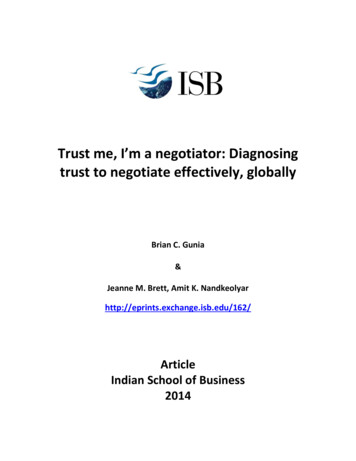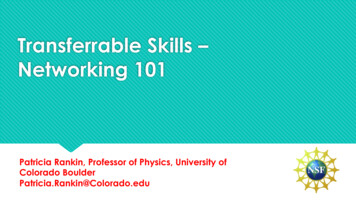
Transcription
Ep #111: How To Negotiate, Even in EmotionalSituationsFull Episode TranscriptWith Your HostThe Brainfluence Podcast with Roger Dooley
Ep #111: How To Negotiate, Even in EmotionalSituationsWelcome to The Brainfluence Podcast with Roger Dooley, author, speakerand educator on neuromarketing and the psychology of persuasion. Everyweek, we talk with thought leaders that will help you improve your influencewith factual evidence and concrete research. Introducing your host, RogerDooley.Roger Dooley:Welcome to The Brainfluence Podcast. I’m RogerDooley. My guest this week is world-renowned forhis work in the field of negotiation and conflictresolution. He founded and directs the HarvardInternational Negotiation Program, which focuseson the human dimensions of conflict resolution.He spent 20 years unraveling the mystery of whatcauses human conflict. The reason I thought you’dlove to hear from him is because he sounds a lotlike a neuromarketer. His research has shown thatrational approaches rarely work because mostconflicts hinge upon non-rational forces: ouremotions and identities.His new book is Negotiating the Nonnegotiable:How to Resolve Your Most Emotionally ChargedConflicts. Welcome to the show, Dan Shapiro.Dan Shapiro:Thank you so much. It’s great to be here.Roger Dooley:Great, just a point of clarification for our listeners,you are the Harvard professor Dan Shapiro and youhave a viewpoint on resolving Middle East conflictsbut you are not the U.S. ambassador to Israel of thesame name, right?Dan Shapiro:This is true. Yes, this is true.The Brainfluence Podcast with Roger Dooley
Ep #111: How To Negotiate, Even in EmotionalSituationsRoger Dooley:Okay. I hope nobody will be disappointed but I thinkthat your viewpoints will probably be much morevaluable to this particular audience.Dan Shapiro:Sorry to interrupt you already but actually a fewyears ago when the ambassador was appointed,you would Google “Daniel Shapiro.” You got hispicture with my bio. So it was something that neitherof us wanted.Roger Dooley:I have an even stranger story. For years if youGoogled me, I was pretty well the only RogerDooley you could find. There’s actually a realpsychologist, I think in Australia, which had to bevery distressing for him to find me as sort of a fauxpractitioner of neuroscience and psychologydominating the results.But a couple of years ago, Marvel and Disney cameout with a character named Roger Dooley in one oftheir TV shows. So now I end up with SheaWhigham’s picture and it’s pretty strange.Dan Shapiro:That’s great.Roger Dooley:Unfortunately, that’s tough competition too inGoogle.Dan Shapiro:Yeah.Roger Dooley:Dan, in reading the premise of your book, I wasstruck by its similarity to what I talk about a lot inmarketing. The decisions are driven by emotionsand non-conscious forces so that marketing that’sfocused on rational decision-making often doesn’tThe Brainfluence Podcast with Roger Dooley
Ep #111: How To Negotiate, Even in EmotionalSituationswork even though most marketers try and focus onfeatures and benefits and price. Your work hasshown that the same is true of negotiation.Dan Shapiro:Yeah, absolutely. I was just giving a workshop lastweek in Switzerland. I had a questionnaire I gaveout to everybody in advance. One person wroteback, “How do you deal with irrational people?” Theinteresting thing about this was that this personspelled irrational—because this person, Englishwasn’t their first language—so they spelled irrational“e-rational.”What struck me is that E could stand for emotion. Idon’t think that emotions are irrational, meaningthere’s no logic or pattern to them. Every emotionhas its logic to it. In a sense, there’s e-rationality aswell as rationality.Roger Dooley:I think you’ve got the title of your next book there,Dan.Dan Shapiro:It might be actually. I’ll have to give you credit foroffering the idea of it.Roger Dooley:Somewhere buried in the acknowledgments.Dan Shapiro:Yes.Roger Dooley:Of course, the question about dealing with irrationalpeople is kind of amusing because in one sense,we’re all irrational people. Although presumablysome are a little bit more rational than others.The Brainfluence Podcast with Roger Dooley
Ep #111: How To Negotiate, Even in EmotionalSituationsDan Shapiro:Yes, exactly. I think it’s often the case that in aconflict or difficult negotiation each side believes theother is more irrational than they are. “I’m rational.You're not.”Roger Dooley:Of course, well simply because you're holdingviewpoints that don’t make sense compared to mycorrect ones.Dan Shapiro:Exactly.Roger Dooley:It seems like negotiations though are kind of rationalprocesses. I mean, you're trying to decide thingslike wages and work rules and national boundariesor whatever you happen to be negotiating. It seemslike this is all sort of very rational, cognitive kind ofstuff versus emotional. Where does the emotioncome into it?Dan Shapiro:I think that is often the assumption that negotiationis a rational game or a rational battle. I think it’sanything but the truth. I think the reality is first weare negotiating all the time. Any time you areinteracting with somebody else, whether it’s withyour spouse over where to go on the holidays orwhether it’s with a team trying to negotiate acorporate strategy, you’re negotiating any time youinteract for a purpose.If human beings are negotiating with other humanbeings, inevitably, emotions will be a part of that. It’smy belief that you cannot avoid emotions any morethan you can avoid thoughts and thinking, dreamsat night, you can't turn it on and off. Much of myThe Brainfluence Podcast with Roger Dooley
Ep #111: How To Negotiate, Even in EmotionalSituationsresearch has really been about how do you channelemotions in a positive direction so that they work foryou in a conflict and a difficult negotiation ratherthan working against you.Roger Dooley:What you're really saying is it’s better to not try andtake emotion out of the process because that couldbe one approach. Remember, boy, the poppsychology thing from years and years ago,transactional analysis, where you had the parentand child.The adult was always trying to kick things into arational mode of stifling the childish outbursts or therule-based parenting and communicate in a veryrational way. But what you're saying is you are notgoing to take emotion out of the process. You haveto figure out how to work with it.Dan Shapiro:Even that parent who’s trying to communicate in aquote/unquote “rational” way, you used the word“stifling.” They're still experiencing emotion. Theymay not be expressing it very explicitly but they'restill feeling a tremendous amount of emotion. Thequestion is how do you have that emotion work forthe parent, work for the child, in that negotiation.There was a story by Freud many years back. Hetalked about a professor teaching in a class. Therewas this really noisy, loud student in the front. Theprofessor finally kicks the student outside the door,locks the doors, continues teaching. However thatstudent outside starts banging twice as loudly onthe door. The teacher still can't teach. I think that’sThe Brainfluence Podcast with Roger Dooley
Ep #111: How To Negotiate, Even in EmotionalSituationsthe reality of emotions. You cannot get rid of them.You can’t avoid them.In reality, we don’t want to. Whether it’sneuromarketing, neuro-influence, or just plain olddealing with your spouse.Roger Dooley:Right, there’s a lot of overlap. I talk a lot aboutpersuasion and that could be in a sales context ormarketing context or whatever but there’s a hugeoverlap with negotiation there. You conducted asocial identity experiment, I guess I'd call it, atDavos. Tell me about that. That was really ahilarious story. Hilarious, but serious too.Dan Shapiro:Exactly. A lot of my work over the years has been ininternational conflict situations. I’ve been working todevelop exercises to help people experience reallya microcosm of those challenges. There’s anexercise that I’ve developed over time, I call it theTribes Exercise. Basically, I just sort of make itcome to life. Davos, at the World Economic Forumin Switzerland, way back in 2006 I was invited to dothis little exercise there for all of these globalleaders who were convening for the annualconference there in the mountains of Switzerland.We had 45 people in our workshop room,everybody from a deputy head of state, leadingacademics, CEOs of Fortune 50 companies. Asthey're walking in the room, they're divided into sixdifferent tables, about eight people per table. I tellthem, “You have this wonderful opportunity today tocreate your own tribes at your table. To create yourThe Brainfluence Podcast with Roger Dooley
Ep #111: How To Negotiate, Even in EmotionalSituationsown group identity in a way. Something that you feelemotionally invested in.” Because with my beliefsthat I believe our world is becoming more and moreof a tribal world.They're looking at me like this is fine, this soundsinteresting, whatever. I say to the group, “You’regoing to have 50 minutes now at your table toanswer a small set of questions through fullconsensus and true to your own belief system.”They're nodding, this is fine, this is fine. Until theylook down at the questions and they realize theseare some of the most morally difficult questions theworld has ever seen.“Does your tribe believe in capital punishment? Yesor no?’”“Does your tribe believe in abortion? Yes or no?”“What are the three key values of your tribe?”“Dress up like your tribe.”I give them balloons and things like that. They say,“Fine, we’ll try this little thing out for you.” They gooff for about 50 minutes, they answer all thesequestions. They come back. You see now sixdistinct tribes. The deputy head of state hasballoons on his head, others do too. Crazy outfits.It’s a very energizing environment. The music isloud.I get in front of the room and I say in the mostboring voice I can muster, “Okay, let’s debrief thisThe Brainfluence Podcast with Roger Dooley
Ep #111: How To Negotiate, Even in EmotionalSituationsexercise.” They look at my somewhat blankly, like,“Okay, what’s the point of this?” It’s right about thismoment that the lights in the room go completelyblack. Into the room bursts this intergalactic alien.Huge bulging eyes. Huge head.The alien says, “I am an intergalactic alien. I havecome to destroy the earth. I will give you oneopportunity to save this world from completedestruction. You must choose one of these sixtribes to be the tribe of everybody. You cannotchange anything about your tribe, or yours, oryours, only one tribe with all of its attributes must bedecided upon. If you cannot come to agreement bythe end of three rounds of negotiation, the world willbe destroyed.”Out floats this alien and as ridiculous as thissounds, these global leaders in our room suddenlyrealized we have a task in front of us. We mustcome to a decision, an agreement.Roger Dooley:I’m surprised they let you get away with that. Thatlike security didn’t Dan Shapiro:Actually, the alien mask, I got it from a localcostume shop. I sent it a week before. It was theday before the workshop, the alien mask still wasn’tthere. On the day of the workshop, literally we havethe top security people from the World EconomicForum, while there're about 50 heads of state there,500 top CEOs there from the Fortune 500companies. And what are all these security peopledoing? They are looking for an alien mask.The Brainfluence Podcast with Roger Dooley
Ep #111: How To Negotiate, Even in EmotionalSituationsRoger Dooley:Great. So did they save the planet?Dan Shapiro:To make a long story short, the longer version is inthe book. The short of it, round one, they try to havea rational conversation. It goes nowhere. Roundtwo, the charismatic CEO attracts one person to hisgroup. The others refuse. Round three, six peoplecome to the middle of the room, one representingeach group. It just so happens it’s five men, onewoman.There’s so much anger and frustration in the room.These men walk into the middle. They start yellingover one another. They start yelling over thiswoman who gets so rightfully enraged that sheliterally stands on her chair and yells, “This is justanother example of male competitive behavior. Youall come to my tribe.” One other tribe comes to hersand joins. The others refuse.And five four three two one boom. Ourworld explodes at Davos. I have run this exercisedozens and dozens of times with executives,business executives, students from Harvard, fromMIT, Chinese diplomats, Middle East negotiators.With virtually no exception—there are a few—butvirtually no exception, the world explodes again andagain and again and again.How do you make sense of this? Rationality is notenough. Even emotions are not enough. Becausethis is a very high EQ, emotionally intelligent, group.There’s something deeper at play. Negotiating theNon-negotiable, my book, tries to look into what thatThe Brainfluence Podcast with Roger Dooley
Ep #111: How To Negotiate, Even in EmotionalSituationsis that causes us, whether it’s in that exercise or inreal life to make our relationships explode whenrationally it makes no sense.Roger Dooley:In some cases at least, the group of people thatyou're working with is probably fairly homogenous.But by creating these separate social identities, Imean this is an experiment I guess worthy of HenriTajfel who did some of the early tests showing howtrivial differences that he could artificially createwould turn people into extremely tribal beings.I’ve used that to explain in part Apple’s successbecause so much of their marketing has been, evenfrom day one, is how different they are. “We’re atribe apart. We’re different than the other guys.We’re also superior.” From the 1984 commercialthrough the Lemmings through the PC guy and Macguy and so on. They’ve emphasized it. It’s beenvery effective for them. They’ve turned theircustomers in many cases into not only loyalists butevangelists.Dan Shapiro:Right.Roger Dooley:That’s great if you're building a brand but notnecessarily if you're trying to reach consensusbetween multiple groups.Dan Shapiro:Exactly, or even within the brand. So what do thedynamics look like within Apple? I don’t know, Ihaven't worked for them, but within almost anyorganization you start to get that tribal kind ofbehavior as well. It can help move the groupsThe Brainfluence Podcast with Roger Dooley
Ep #111: How To Negotiate, Even in EmotionalSituationstoward greater productivity. If it’s not managed well,you can have an implosion within your organization.Roger Dooley:Sure. There’s a classic conflict between sales andmanufacturing or staff and line.Dan Shapiro:Absolutely.Roger Dooley:Yeah, it happens in every company. One, as soonas it hits some size where you can actually formtribes. It almost inevitably comes into play.Dan Shapiro:I agree with you. I think it even can be at theinterpersonal level. Again, the spouses who are inthe midst of a conflict, it can start to feel in a waylike a tribal conflict. At least in the way I see thedynamic because it’s still, it’s me versus you. It's usversus them. There’s that division of identity. Youare different. I am superior. We are adversarial. Inthe book, I give that the name, I call it the TribesEffect. What I mean by that is that it’s an adversarialmindset.It’s not just fight or flight but it’s a mindset thatsticks. So you have the divorcing couple who arefeeling animosity toward one another or within theorganization, the same dynamic. It’s hard to unstickit.Roger Dooley:Can negotiation, or the process of engaging innegotiation, trigger, even increase the TribesEffect?Dan Shapiro:It depends on how one frames the process. It canabsolutely intensify animosity and us/them mindset.The Brainfluence Podcast with Roger Dooley
Ep #111: How To Negotiate, Even in EmotionalSituationsA lot of my work is trying to help people see thatthat mindset does not get you more value most ofthe time in the negotiation. It gets you less. Itdoesn’t help relationships, it tends to hurt them. Itreduces the value that’s on the table.Really one of the key insights of negotiation is howdo you turn that other person from an adversary intoa colleague, even when you're dealing withcontentious issues? How do you turn it so it’s notmarketing versus research or me versus thecolleague down the hall, but it’s the two of us facingthe same shared problems within the organization?Roger Dooley:So how do you do that?Dan Shapiro:One practical piece of advice, ask advice. Ratherthan walking in and saying, “You know what Roger,this all your fault. Why did you do ” and blaming,you can try to shift the dynamic by doing somethinglike asking advice. Look, we have a problembetween us. We could spend all afternoon arguingback and forth. I don’t think that’s going to be veryeffective. What’s your advice on how we might dealwith this situation? Simply by asking that question, Iturn you from an adversary into a colleague. You'renot the problem anymore. I’m not the problem. It’sthe two of us facing it, being the problem betweenus in a way.Roger Dooley:Dan, have you ever tried to run your alienexperiment with that in mind? In other words, thereyou’ve got this external influence, the alien who’sgoing to destroy the world. You’ve got these tribesThe Brainfluence Podcast with Roger Dooley
Ep #111: How To Negotiate, Even in EmotionalSituationsthat are so self-oriented and tribally-orientated thatthey are not cooperating. Have you tried to modifythe experiment to implement this kind of thinkingand does it actually work?Dan Shapiro:Well, no I haven't. First of all, people assume a lotabout the us/them nature of their negotiation.Nobody ever thinks to negotiate with the alien forexample. They automatically assume the alien isevil—well, it’s saying it’s going to destroy the world,so it might be. But at the same time, nobody everhas thought to really engage the alien andnegotiate. “So alien, hey, we’d like to include you inour community. Would you be interested?” Youdon’t know.Now, so there is still opportunity for creating agreater identity, even in the exercise as it’s run. Atthe same time, I sort of like to keep it the way it isbecause people feel very shocked when the worldexplodes at their own hands. The exercise in asense helps people to see all of the constraints thatmove us toward us/them thinking. They have 50minutes or 60 minutes to define their own smalltribal identity. They have a much shorter amount oftime to try and create a joint identity. They spend 50minutes or 60 minutes again answering some of theworld’s most difficult moral questions and they onlyhave a short amount of time to try to findcommonality between them.The way I plan the seats in the exercise has animpact on the extent to which they feel close ordistant to others. The fact that they're wearing theThe Brainfluence Podcast with Roger Dooley
Ep #111: How To Negotiate, Even in EmotionalSituationstribal garb, they have their tribal sounds, all of thisplants them in an identity in a short amount of time.An identity that is against the other. They don’t evennotice most of this happening.I don’t see it as an experiment as much as aneducational exercise to help people become moreaware of all of the factors that can lead a group or abusiness or a company toward either division andloss of value or toward, in a sense, a communalmindset and really value maximization.Roger Dooley:What’s your take, Dan, on the rhetoric in this year’spresidential campaign? It seem like tribalism isrampant on really both sides, whether it’s Trumpwith his nationalistic appeal or Bernie Sanders sortof rallying the 99 percent, we’re going to take whatthe 1 percent have and spread it out evenly. Do wehave a bleak political future? How are we going toget around this? Because of course we've seen thesame thing happening in Congress with seeminglygreater polarization and unwillingness to negotiate.Dan Shapiro:I watch it and I cannot help but think of my tribesexercise. Within each party, between parties, it islike tribes competing against one another. Not evenjust competing but adversarial with one another.They fall right into that category of playing out theTribes Effect, that us versus them thinking. Eachtrying to sabotage the other. I think if two people arestuck on a lifeboat out at sea and each tries tosabotage the other. They're going to end upnowhere but dead.The Brainfluence Podcast with Roger Dooley
Ep #111: How To Negotiate, Even in EmotionalSituationsIt’d be much better if the two individuals worktogether and paddle to shore. I think cooperationmight sound like an unrealistic proposition in thiscurrent political climate. I don’t believe that’s true. Ithink the best leaders are able to draw upon theirplatform to lead across the aisle and within theirown parties.At the end of the day, I look at it and I go, wait aminute, let’s say Democrats and Republicans. It’slike they're two tribes from different planets. Thereality is, no, you're both part of the United States.In order for effective governance to happen, we doneed to work together. How do we work to buildgreater affiliation within each party and between theparties? I think that’s essential. Even down to verypractical things.Just bringing back that old-fashioned WashingtonD.C. lunch where the senators sit down and have aprivate get-together between parties. That kind ofstuff is incredibly useful for helping them to openchannels to more effective communication.Roger Dooley:Yeah, I think certainly it’s true in politics and intoday’s politics but probably in other areas ofnegotiation as well where if one member of a grouptries to sort of find those areas of commonality,others in the group will then attack that person andaccuse them of being weak or somehow in leaguewith the wrong side. In some countries, that personmight end up meeting a fatal accident. But herecertainly even, mostly in politics, but certainly inThe Brainfluence Podcast with Roger Dooley
Ep #111: How To Negotiate, Even in EmotionalSituationsother areas, that person who shows flexibility will beattacked for that flexibility.Dan Shapiro:It’s a huge risk. In Negotiating the Non-negotiable,one of the things I talk about is taboos. Taboos aresocial prohibitions. They are unwritten rules thatprevent us from doing certain things or sayingcertain things. Democrat, don’t talk to theRepublicans. Republican, don’t talk to theDemocrat. Israeli, don’t talk to the Palestinian.Palestinian, don’t talk to the Israeli.How in the world can you ever have peace in theMiddle East for example if the sides cannot talk toeach other? How in the world are we ever going tohave an effectively operating governance system ifthe two sides of our government don’t talk to oneanother?Now I agree with you, there’s a danger that one canget decapitated, at least politically by talking to theother side. There’s a taboo against it and there aresocial consequences, punishment, for actually doingit. That said, there are absolutely ways that one cancreate a safe space, a somewhat brave space, forpeople to have dialog.Let me give you an example. About four or fiveyears ago, nobody, and I say nobody and I meanalmost nobody, thought that it was possible forIsraelis and Palestinians to get back to the formalpolitical negotiation table. My own thought was,“Well, if you don’t believe it’s even possible, you'reThe Brainfluence Podcast with Roger Dooley
Ep #111: How To Negotiate, Even in EmotionalSituationsgoing to do nothing about it. And self-fulfillingprophesy, nothing will happen.”I started thinking, “What can we do?” One of theefforts that I did was to put together a group ofIsraeli and Palestinian and international leadershipunder the umbrella of the World Economic Forum.We met in Sharm El-Sheikh, Egypt and we had aconversation. The topic of our conversation was ontaboos. What are some of the major taboosstopping people from talking to the other side in theIsraeli-Palestinian conflict?We then had them within the safety and privacy ofthis workshop think through, “What’s the use of thattaboo? What are the dangers of having that taboo?Do we want to break the taboo? How could webreak the taboo?” It was an incredibly powerfulsession. Tony Blair was there and later gave apublic statement that this really had an impact inhelping to bring the parties back to the negotiatingtable some time later.I think, yes, it is taboo for quote/unquote “sides,”Democrats, Republicans, to talk to the other side,even to talk within to some of the others inside. Howdo we create the safe spaces for them to havesome of those conversations? Maybe it’s not in apublic restaurant in Georgetown. Maybe it’s in aprivate setting at an embassy event or somethingwhere you can have some of these individuals gettogether, meet one another, look each other in theeyes. You build that affiliation that allows for trust,The Brainfluence Podcast with Roger Dooley
Ep #111: How To Negotiate, Even in EmotionalSituationsopen information sharing. Ultimately, more effectivegovernance to happen.Roger Dooley:Probably a good way in general to negotiate wouldbe to do as much as possible perhaps outside thatpublic eye where you're going to get immediatefeedback on everything that you're discussing.Because ultimately, some of the more successfulnegotiations really do involve compromise and theyinvolve individual leaders often who are comingtogether and giving on important stuff that initiallytheir supporters probably would not have gone for.But by spending that time separately, as you say, ina safe space, they can actually work this out.Dan Shapiro:I agree with you. I mean, it’s attention. Because ifthe leaders meet in private and then come togetherand publicly announce an idea, there’s a dangerthat they might get revolt from the people. The OsloAccords were done in private in the Middle East andonce they were publicly announced, there was abacklash against them.It’s the same as two CEOs or two leaders fromdifferent divisions within an organization. Thosedivision or departments may not get along. Youhave the leaders coming together. They announce anew decision. The people go, “What? You talked toother side and this is what you decided and youdidn’t consult us before doing that?” It’s a very tightrope to walk.But I think you’re right that there is an importance inhaving some private conversation. You also need toThe Brainfluence Podcast with Roger Dooley
Ep #111: How To Negotiate, Even in EmotionalSituationsthink through how do you then engage the broaderconstituency in that conversation as well.Roger Dooley:Well, sure, yeah. If you come to a conclusion that isgoing to be extremely unpopular, that creates itsown issues.Dan Shapiro:That’s right, exactly.Roger Dooley:Do you have any other examples? I don’t want toleave this conversation on a negative note thatbasically the future of the world is in dangerbecause even a guy in an alien mask can't bring asmall group of people together. You have any otherexamples of a successful negotiation that took intoaccount the Tribes Effect and perhaps looked verydifficult to solve at first but was ultimately resulted inan agreement?Dan Shapiro:Sure. As another example, there was absolutelythat Tribes Effect phenomenon happening in LatinAmerica between Peru and Ecuador. There hadbeen a long-standing conflict between these twocountries over a small piece of land called Tiwintza.Each side claimed Tiwintza as theirs and theirsalone. Each side had their own historical maps toprove that they were right and the other was wrong.There had been war.The U.S. State Department called this the longeststanding armed conflict in the history of the westernhemisphere. In 1998, Jamil Mahuad was electedpresident of Ecuador. It turns out he was a studentof mine at one point. He was a student of myThe Brainfluence Podcast with Roger Dooley
Ep #111: How To Negotiate, Even in EmotionalSituationscolleague Roger Fisher’s at one point. He calls upour organization, he says, “Look, I'm the newlyelected president. I’m about to meet with PresidentFujimori of Peru. How do I negotiate?”One might say that this is trying to negotiate thenon-negotiable. Why even try? But he wasinterested in trying. So the question then is what’sthe advice? How do you shift it so it’s not that TribesEffect, that adversarial mindset? How do you shift itso it’s not a hopeless situation? Just a couplepieces of advice that we offered.One piece of advice was to walk in and whenmeeting with President Fujimori, don’t start byclaiming your position and asking his. So, “Here’sour position, what’s yours?” That’s the classicapproach and it’s classically wrong. A much betterapproach is what President Mahuad ultimately did.He walked in and said to President Fujimori,“What’s your advice? You’ve been president foreight years. You’ve dealt with four of mypredecessor presidents. Practically speaking, whatis your advice on how we might deal with thisconflict together?”Simply by asking that question, it reframes theirrelationship from adversaries butting heads tocolleagues sitting side by side, facing the sameshared problem. To make a long story short, thatrelationship was essential to what ultimatelyensued. Ten meetings later, 77 days later, theycame to a full and binding agreement that stands tothis day. In fact, President Mahuad wrote a firstThe Brainfluence Podcast with Roger Dooley
Ep #111: How To Negotiate, Even in EmotionalSituationshand account of how he utilized some of ourconcepts in a book that we published a few yearsback.The challenge really is how do you shift it so it’s nolonger me versus you to being us against theproblem. It’s not my wife and I—it’s not I’m theenemy and she’s the enemy. That’s going to be aterrible family dynamic. We have a shared problem,how are we going to deal with it?Roger Dooley:Right. So really, Dan, you're saying that sameappro
His new book is Negotiating the Nonnegotiable: How to Resolve Your Most Emotionally Charged Conflicts. Welcome to the show, Dan Shapiro. Dan Shapiro: Thank you so much. It's great to be here. Roger Dooley: Great, just a point of clarification for our listeners, you are the Harvard professor Dan Shapiro and you











